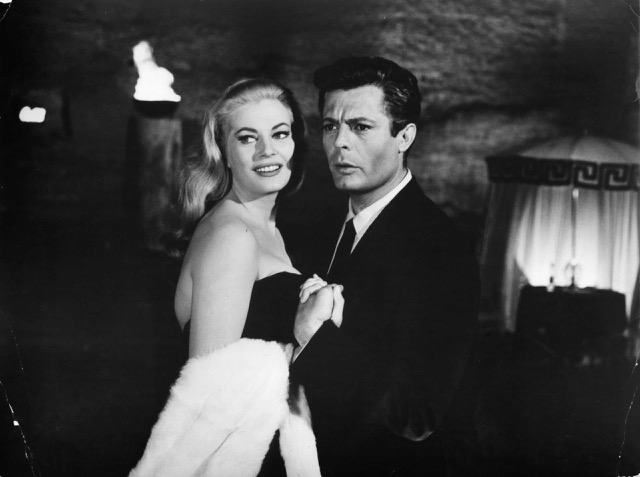
Widely considered to be one of the most important films ever made, there’s a plaque on Rome’s Via Veneto that, translated from the Italian, reads: “TO FEDERICO FELLINI, who made Via Veneto the stage for ‘La Dolce Vita.’” That plaque was erected in 1995, thirty-six years after the film was made, and the film continues to resonate today.
Come see what all the fuss is about on Wednesday, May 29, when Coronado Island Film Festival, as part of its monthly Classic Film Series, presents Fellini’s “La Dolce Vita” at Coronado’s Village Theatre, 820 Orange Avenue. Doors open at 5 pm for complimentary refreshments, followed by a vintage Road Runner cartoon and feature presentation at 5:30. Tickets are $15 and are on sale now at coronadofilmfest.com.
Released in 1960, “La Dolce Vita” is a masterpiece amidst an impressive collection of Fellini masterpieces that includes “8 1⁄2,” “Amacord,” and “La Strada.” It stars Marcello Mastroianni, Anouk Aimee, and Anita Ekberg, and follows a typical week in the life of a bored gossip columnist living in Rome (Mastroianni). And then there’s his young photographer friend Paparazzo, played by Walter Santesso, always in hot pursuit of “the perfect shot,” giving us the term we know too well to this day, “paparazzi.” And, of course, there’s “that scene” of Mastroianni and Ekberg cavorting in the Trevi Fountain. Oh yes.
The late film critic Roger Ebert declared “La Dolce Vita” his favorite movie of all time, calling it “one of the most visually fluid movies ever made, a movie that approaches music in its rushing passion, not simply because Nino Rota’s score is one of the best ever recorded, but because the characters seem to move with the music in them.”
Felllini was an interesting man. He was born into a middle-class family in the small town of Rimini on the Adriatic Sea, where today he lies buried in the Monumental Cemetery of Rimini, alongside actress Giulietta Masina, his wife of fifty years, and their infant son (their only child). Early on, Fellini showed a talent for writing and illustrating (his first jobs), which later advanced to screenwriting and directing films. There is hardly a contemporary filmmaker alive today who doesn’t name Federico Fellini’s work as a major influence. That list includes Martin Scorsese, Woody Allen, Tim Burton, Pedro Almodovar, Alejandro Inarrito, Lorgos Lanthimos, George Lucas, and David Lynch.
As an adult, Fellini suffered from severe clinical depression and, encouraged by his wife, entered into treatment with Freudian psychotherapy, and later Jungian, which no doubt enhanced his work. He is known today for his distinctive style, blending the fantasy of his rich imagination and baroque imagery with unabashed earthiness.
Fellini was nominated for 17 Academy Awards during the course of his career, winning a total of four. He also received an honorary Lifetime Achievement Award at the 65th Academy Awards in Los Angeles. In 1960, he was awarded the coveted Palme d’Or at Cannes Film Festival for “La Dolce Vita.”
Next month: A change of pace awaits on Wednesday, June 26. Don’t miss the Western satire, “Blazing Saddles,” an audience fave. Tickets are available now.
And get excited for CIFF 2024, Wed. Nov. 6 – Sunday Nov. 10! Get your passes now at coronadofilmfest.com.




